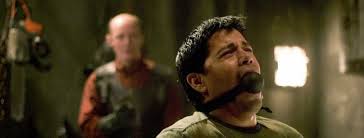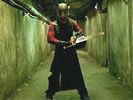Eye For Film >> Movies >> Hostel (2005) Film Review
Hostel
Reviewed by: Chris

With a firm eye on the box-office, Hostel is a mixed bag of gore goodies with plenty of inspiration but a shortage of creative originality.
Like a no-brain version of Saw, Hostel starts off in a dark torture room. There then follows 45 minutes of non-violent action following three male backpackers as they wend there way through a tedious sequence of bouncing bosoms and hashish bongs. Starting in Amsterdam (portrayed none too realistically, with a marked absence of Dutch), they follow a trail given them by dodgy fellow travellers to find a hostel in Bratislavia promising to be brim-full with sex-starved women and a post-war shortage of men. When they get there, they are lured one by one to a neglected building that shows "art exhibits", such exhibits being people gratuitously tortured and killed by perverts paying a high fee.

Although much blood is used to drench the set, writer-director Eli Roth (Cabin Fever) makes the mistake of descending into black humour and then winding up with a suitably crowd-pleasing ending. One rather wishes he had learnt from his brief brush with anti-Hollywood studio Troma - where he had small acting parts in the low-budget but very effective Toxic Avenger IV and Terror Firmer - and chosen either seriously nasty horror or gruesome Troma-style camp.
Although there is no shortage of nauseating images, from chainsaws to surgical instruments, Hostel rather looks as if it used the British Board of Film Censors guidelines as its handbook. The camera jumps away at the crucial moment (except when violence is perpetrated by the hero), and Roth fails to stylise the brutality with either slow motion, detailed close-ups or snappy editing. The pedestrian acting is competent for the limited demands placed on it, but the script is trite and full of the sort of macho posturing American cinema would sadly have us associate with US undergraduates.
Such amateurishness of technique fails on two counts. Firstly, horror is defined in terms of emotional impact. Such lightweight treatment means the shock value of the ideas and images themselves have to take the full burden. Since Hostel is no better or worse than any reasonable gore flick, yet was well-marketed, it at least might succeed simply by attracting audiences that are either undemanding of the genre or are shocked because of lack of exposure to good horror films.
Secondly, given the story line, there are ample opportunities for creative effectiveness missed largely because, as the film has low artistic merit, it must conform to the lowest criteria of the censors. For instance, modern CGI is capable of very realistic simulation of violence - as evidenced in the scene in Irreversible where a man's head is caved in with a fire extinguisher without the camera flinching away. Good editing can also extend the emotional effect of violence to a very uncomfortable level - in Audition, for example, the build up is so subtle, and the first movement of a person tied up in a bag so sudden, that the audience skips a collective heartbeat. Both Irreversible and Audition are such cinematic masterpieces that the censor treats the violence more leniently - Hostel is trapped by its own mediocrity into the level of shocks it can deliver.
Ironically, Roth had plenty of talent to hand, including the director of Audition Takashi Miike, and Quentin Tarantino (both of whom have cameo parts). Yet the most artistic moments are those derived from better films: as a sadist surgeon approaches his victim and gasps for air beneath his mask it recalls the similar scene in Blue Velvet. Another high point, when a torturer loses control, is effectively emphasised by the identical discordant bursts of background music that were used by Bernard Herrmann in the famous Psycho shower scene. Many other scenes - such as a partially dissected Asian girl - are glimpsed only briefly and not used to their full dramatic potential.
In its favour, there is some genuine tension in the car chase sequences, and the marauding gangs of children seem not only authentic but realistically threatening. A girl's suicide borrows effectively from Japanese horror as she is frozen momentarily in the camera before death. For all its superficiality, the main story is almost like a modern day vampire movie with buxom Eastern European wenches luring westerners to their doom before the hero tries to nail the bad guy. Its token believability (there are no mutants, ghouls, supernatural forces) - heavily supported in the official website by oblique references to horrific happenings - gives it a slightly darker twist than the modern monster movie (Hills Have Eyes) or the overworked slasher series.
Shot in a few months for just over £4 million, Hostel covered its cost more than fourfold in its first weekend. That it will shock quite a few large audiences and entertain others makes it unfair to categorise the film as worthless, but also makes it likely to be overrated.
The three thrill-seeking, homophobic, racist backpackers (two American, one notably Icelandic) are so unlovable that one really doesn't care whether they are tortured and killed or not - it might make for better movies if such characters were permanently exterminated rather than going on to repopulate the more standard fare teen-slasher movie or umpteenth American Pie. In an interview, Roth claims he apologised (jokingly) to the Icelandic President for the irreparable damage he was doing to Iceland. Maybe he should just have apologised for making a bad film.
Reviewed on: 26 Mar 2006




















